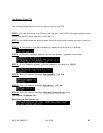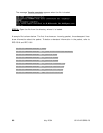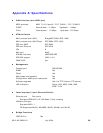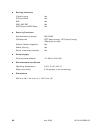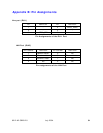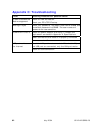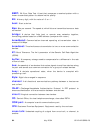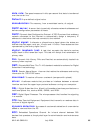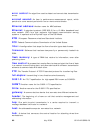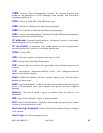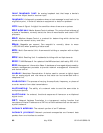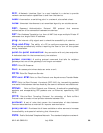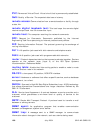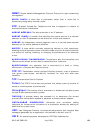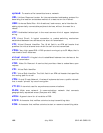6212-A2-GB20-20 July 2004 95
data rate: The speed measured in bits per second that data is transferred
over the carrier line.
Default: A pre-defined original value.
demodulation: The recovery, from a modulated carrier, of a signal.
DHCP server: A server that dynamically allocates network addresses and
delivers configuration parameters to hosts.
DHCP: Dynamic Host Configuration Protocol. A TCP/IP protocol that enables a
network connected to the Internet to automatically assign a temporary IP
address to a host when the host connects to the network.
digital signal: A discrete or discontinuous signal where the states are
discrete intervals apart, such as +10 volts and –10 volts. These states are then
represented by the binary digits 0 and 1.
digital: loopback test:
A test that connects the device’s receiver
output back to the transmitter input. This test will disrupt the transmission of
primary data.
DLL: Dynamic Link Library. DLLs are files that are automatically loaded into
memory when required.
DMT: Discrete MultiTone. The T1.413 standard modulation scheme for Digital
Subscriber Line technology.
DNS: Domain Name Server. A server that retains the addresses and routing
information for TCP/IP PAT users.
download:
To receive a file over a network (compare with upload).
driver:
A software module that provides an interface between a network
interface card and the upper-layer protocol software running on a computer.
DSL:
Digital Subscriber Line. A family of broadband services provided over a
traditional phone line, such as ADSL, SHDSL, and VDSL.
DSP: Digital Signal Processor. The microprocessor that handles line signaling
in a modem.
DTE: Data Terminal Equipment. Equipment that transmits or receives data in
the form of digital signals.
dynamic detection: A process of a automatic detection of a new device
added or removed from the PC.
EOC: Embedded Operations Channel. An in-band channel between DSL
devices that operates at the physical layer for administration and maintenance
data.



